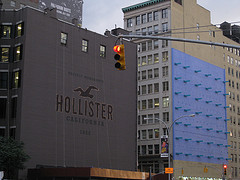Judge Says Abercrombie & Fitch’s Hollister Stores Don’t Treat Disabled Customers Right
Abercrombie & Fitch is in hot water again, once more over claims that the company isn’t treating everyone equally. A federal judge in Denver is mulling over an injunction against Hollister, which is part of the A&F family. Earlier the federal judge had ruled that almost 250 Hollister stores are unfriendly to the disabled, because entry doors aren’t all easily accessible.
Several Colorado customers filed a lawsuit back in 2009 claiming they couldn’t easily get into retail locations, and that the sales countertops are too high, reports the Associated Press. One customer wheelchair-using customer said she’d tried to go to a Colorado Hollister, but had trouble getting through a side door because there wasn’t access to the front door.
After lawyers for the plaintiffs compared the situation of using separate doors to the fight for desegregation in the 1960s, Hollister’s attorneys called that reference “grossly inaccurate and needlessly inflammatory” and asked that it be stricken from court documents.
The plaintiff who had to use the side doors called it an embarrassing experience, saying today:
“As a person who has grown up with a disability who was excluded from many public and private buildings and experiences (including) school, dining, shopping, arguably because those buildings were built pre-ADA (Americans With Disabilities Act), I am simply referencing an attitude of exclusion that was prevalent during that time,” she said.
The doors have labels of “Bettys” and “Dudes,” but Hollister’s claims that they’re accessible to the disabled are a sham, she says.
“The (side) entrances are artificial two steps up and two steps down, built to create an atmosphere for marketing purposes. That is what makes them illegal,” she said.
The judge would issue the injunction as a way to order the company to fix the situation by providing accessible entrances for the disabled. But Hollister’s team says it’d be too expensive to redo the entry doors, and force the retail locations to close for up to 10 days, causing a disruption in business, and a potential cost of $8 million.
Hollister and Abercrombie say it’s impossible to install ramps in shopping malls, and that shutting off elevated entrances would be “the worst and least acceptable” of the proffered solutions because consumers would be confused. And if they’re confused, they might not find their way into the stores.
Judge: Hollister clothing unfriendly to disabled [Associated Press]
Want more consumer news? Visit our parent organization, Consumer Reports, for the latest on scams, recalls, and other consumer issues.


